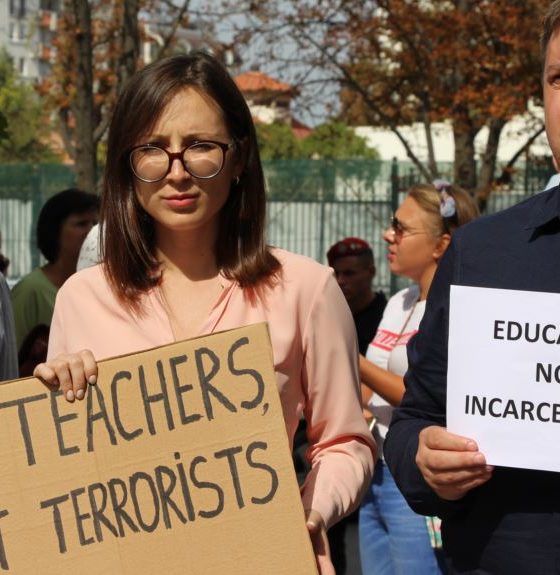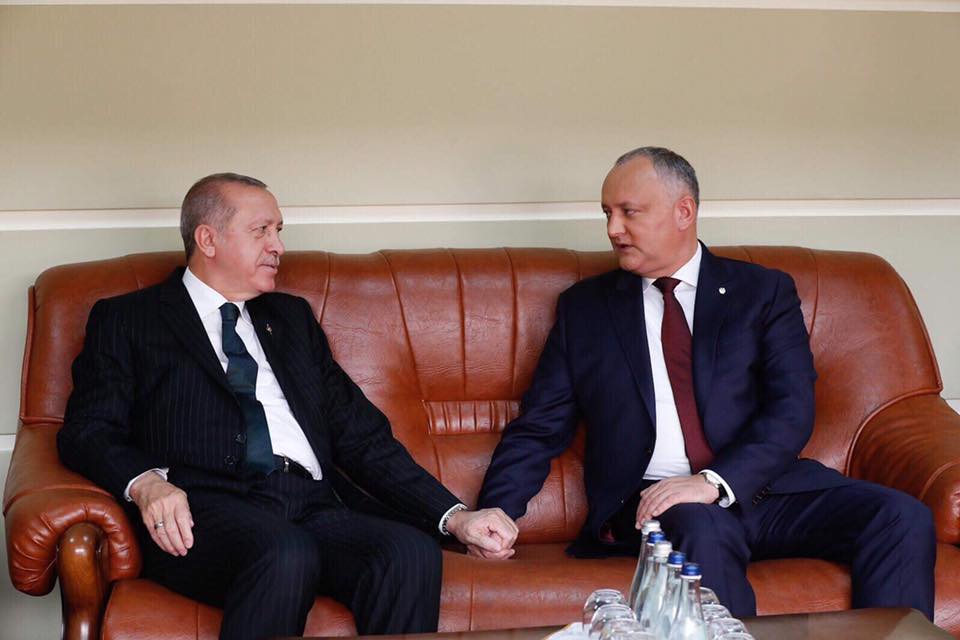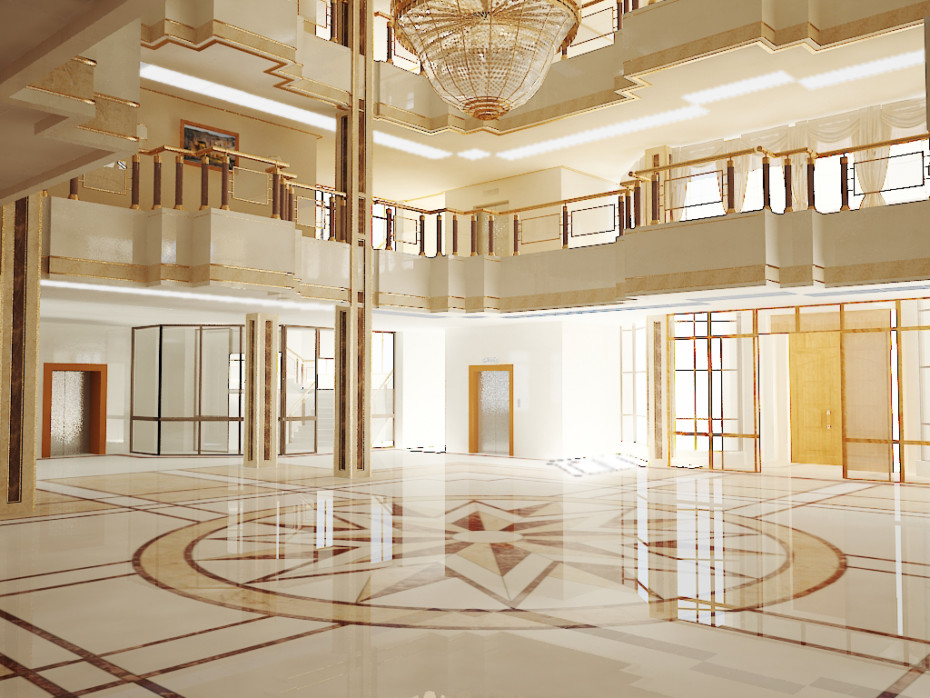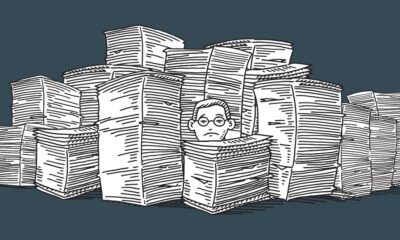

Politics
The Turkish teachers’ expulsion case – is the mystery solved?
Few days ago, Prosecutor General Alexandru Stoianoglo announced in a press conference that a criminal case, filed against the former director of the Information and Security Service (ISS), Vasile Botnari, for abuse of service in the expulsion under supervision of Turkish teachers from Moldova, was sent to the court.
According to the prosecutor general of Moldova, the entire operation of removal of Turkish citizens from the country was arranged, coordinated and managed directly by Botnari. Other persons earlier figuring in the same criminal prosecution – two former ISS deputy directors and the head of the Bureau of Migration and Asylum (BMA) – were declared as executing the ISS director orders without knowing that they were illegal, as Stoianoglo stated.
The former ISS director was the only one who has admitted his guilt, even though the other parts’ involvement in the case is evident, as a sic.md article pointed out.
The probation office declared that the ISS has taken over the removal actions in the absence of a written request from the BMA or a collaboration agreement in this regard, that is while the BMA is the only institution competent to organise and carry out the necessary activities in order to remove foreign citizens from the country.
“The fact that Vasile Botnari played a key role in the removal of the seven Turkish teachers from Moldova is clear. The moment he admits his entire guilt as some kind of scapegoat is clear. It is hard to believe though that prosecutors are so naive. […] And is ridiculous that absolutely no one else will be held responsible for one of the most shameful and criminal moments in the contemporary history of Moldova,” stated the sic.md article.
The former head of the BMA, Olga Poalelungi, removed from office in September 2019, and accused of expulsion under supervision of Turkish teachers, was reinstated to the former position. That happened despite the fact that her signature stands on the decision of the BMA, according to which the Turkish citizens were declared undesirable on the territory of the Republic of Moldova.
Background
In September 2018, seven Turkish teachers from Orizont Lyceums were arrested in a joint operation conducted by the Moldovan and Turkish secret services. They were taken directly to Chisinau Airport, where a charter plane was waiting for them and immediately took them to Turkey. Their families had no knowledge of their fate for several weeks.
Reputable international media portals, such as Reuters, wrote about the case of the expulsion under supervision of seven Turkish citizens. “The detainees were teachers and officials at a network of schools originally set up by the movement of U.S.-based Muslim cleric, Fethullah Gulen, which Turkish authorities hold responsible for a failed 2016 coup in Turkey,” is mentioned in the Reuters article.
Moldova’s ISS stated, at that moment, that foreign nationals were expelled because they posed a threat to national security. It is worth mentioning that all Turkish citizens who were improperly removed from the territory of the Republic of Moldova were sentenced to prison in Turkey. “The Moldovan authorities didn’t just violate these individuals’ rights once by deporting them – they put them on a fast-track to further human rights violations such as an unfair trial.” said Marie Struthers, Amnesty International’s Director for Eastern Europe and Central Asia in a statement.
By its decision of June 11, 2019, the ECtHR found a violation of Articles 5.1 and 8 of the European Convention on Human Rights and forced the Government of the Republic of Moldova to pay 25 000 euros for five Turkish citizens, whose rights were violated, the total amount for the compensation of the moral damage being of 125 000 euros.
Igor Dodon and (his) Presidency
On December 31, 2019, during the visit of the President of the Republic of Moldova, Igor Dodon, in Ankara, the President of Turkey, Recep Tayyip Erdogan, officially thanked Dodon for the fact that the Moldovan authorities expelled the Turkish teachers from Moldova and brought them to the Turkish authorities.

President Igor Dodon several time denied that expelling citizens at the behest of the Turkish authorities was one of the conditions attached to Ankara’s donation to the renovation of the Moldovan presidential building.
The renovation of the presidential building was carried out by a Turkish construction company called Sonbay, according to an announcement of the Embassy of Turkey in the Republic of Moldova. The Embassy stated that, “the repair of the Presidency building represents a donation offered to the Moldovan people by the Turkish people,” as it was cited by ZdG.

The renovated Presidency building| source: zdg.md
Initially, the construction company announced that a sum of 7 180 000 euros will be used for reconstruction. Shortly after the Moldovan press announced the amount of the investment, the information was deleted from the company’s website.
Children’s hunting
Bușra Zeynep Șen, a teacher of Turkish origin from the International High School of Informatics in Bucharest, who is also Turgay Șen’s daughter – the former president of the Orizont Lyceums from the Republic of Moldova – was detained by police, based on a warrant issued by the Turkish authorities in December 2019.
Turgay Șen was detained at Chisinau Airport in March 2018, then heard for 7 hours at the Prosecutor’s Office for Combating Organised Crime and Special Cases and banned from leaving the country for a period. At that time, Turgay Șen declared that the criminal case against him was filed at the indication of the Moldovan leaders, in the interest of the Turkish authoritarian regime, in response to the donation for the restoration of the Presidency building.
Bușra’s lawyer explained to the Romanian media that the teacher was accused of being part of a terrorist group, while she already was employed as a teacher in Bucharest. Moreover, the Turkish citizen was tried in her absence in Turkey.
Fortunately, the extradition of Bușra Zeynep Șen was rejected. “From studying the warrant, I appreciate that extradition is required for political and social reasons, which violates human rights. The Prosecutor’s Office called for the extradition request to be rejected,” claimed the case prosecutor.
Bușra Zeynep Șen said for Moldova.org that all Turkish citizens living abroad became extremely vigilant after all the Turkish Government’s actions. However, Bușra never thought that the Turkish authorities would go through these procedures for her. “I am a 24-years-person. I lived in Turkey four years only, when I studied at the university. What could I have done to make them work so hard to get me back?” the woman wondered.
**
According to a press release published on the website of the State Information Agency from Moldova, the national mechanisms that regulate the status of foreigners are focused on identifying the reasons for removing the foreigners from the Republic of Moldova, rather than ensuring the necessary protection for them, the legal norms do not offer effective guarantees to the applicants for protection, and the administrative bodies often abuse the assigned prerogatives.
Photo: moldova.europalibera.org
Society
“They are not needy, but they need help”. How Moldovan volunteers try to create a safe environment for the Ukrainian refugees

At the Government’s ground floor, the phones ring constantly, the laptop screens never reach standby. In one corner of the room there is a logistics planning meeting, someone has a call on Zoom with partners and donors, someone else finally managed to take a cookie and make some coffee. Everyone is exhausted and have sleepy red eyes, but the volunteers still have a lot of energy and dedication to help in creating a safe place for the Ukrainian refugees.
“It’s like a continuous bustle just so you won’t read the news. You get home sometimes and you don’t have time for news, and that somehow helps. It’s a kind of solidarity and mutual support,” says Vlada Ciobanu, volunteer responsible for communication and fundraising.
The volunteers group was formed from the very first day of war. A Facebook page was created, where all types of messages immediately started to flow: “I offer accommodation”, “I want to help”, “I want to get involved”, “Where can I bring the products?”, “I have a car and I can go to the customs”. Soon, the authorities also started asking for volunteers’ support. Now they all work together, coordinate activities and try to find solutions to the most difficult problems.
Is accommodation needed for 10, 200 or 800 people? Do you need transportation to the customs? Does anyone want to deliver 3 tons of apples and does not know where? Do you need medicine or mobile toilets? All these questions require prompt answers and actions. Blankets, sheets, diapers, hygiene products, food, clothes – people bring everything, and someone needs to quickly find ways of delivering them to those who need them.
Sometimes this collaboration is difficult, involves a lot of bureaucracy, and it can be difficult to get answers on time. “Republic of Moldova has never faced such a large influx of refugees and, probably because nobody thought this could happen, a mechanism of this kind of crisis has not been developed. Due to the absence of such a mechanism that the state should have created, we, the volunteers, intervened and tried to help in a practical way for the spontaneous and on the sport solutions of the problems,” mentions Ecaterina Luțișina, volunteer responsible for the refugees’ accommodation.
Ana Maria Popa, one of the founders of the group “Help Ukrainians in Moldova/SOS Українці Молдовa” says that the toughest thing is to find time and have a clear mind in managing different procedures, although things still happen somehow naturally. Everyone is ready to intervene and help, to take on more responsibilities and to act immediately when needed. The biggest challenges arise when it is necessary to accommodate large families, people with special needs, for which alternative solutions must be identified.
Goods and donations
The volunteers try to cope with the high flow of requests for both accommodation and products of all kinds. “It came to me as a shock and a panic when I found out that both mothers who are now in Ukraine, as well as those who found refuge in our country are losing their milk because of stress. We are trying to fill an enormous need for milk powder, for which the demand is high and the stocks are decreasing”, says Steliana, the volunteer responsible for the distribution of goods from the donation centers.
Several centers have been set up to collect donations in all regions of Chisinau, and volunteers are redirecting the goods to where the refugees are. A system for processing and monitoring donations has already been established, while the volunteer drivers take over the order only according to a unique code.
Volunteers from the collection centers also do the inventory – the donated goods and the distributed goods. The rest is transported to Vatra deposit, from where it is distributed to the placement centers where more than 50 refugees are housed.
When they want to donate goods, but they don’t know what would be needed, people are urged to put themselves in the position of refugees and ask themselves what would they need most if they wake up overnight and have to hurriedly pack their bags and run away. Steliana wants to emphasise that “these people are not needy, but these people need help. They did not choose to end up in this situation.”
Furthermore, the volunteer Cristina Sîrbu seeks to identify producers and negotiate prices for products needed by refugees, thus mediating the procurement process for NGOs with which she collaborates, such as Caritas, World Children’s Fund, Polish Solidarity Fund, Lifting hands, Peace Corps and others.
One of the challenges she is facing now is the identifying a mattress manufacturer in the West, because the Moldovan mattress manufacturer that has been helping so far no longer has polyurethane, a raw material usually imported from Russia and Ukraine.
Cristina also needs to find solutions for the needs of the volunteer groups – phones, laptops, gsm connection and internet for a good carrying out of activities.
Hate messages
The most difficult thing for the communication team is to manage the hate messages on the social networks, which started to appear more often. “Even if there is some sort of dissatisfaction from the Ukrainian refugees and those who offer help, we live now in a very diverse society, there are different kind of people, and we act very differently under stress,” said Vlada Ciobanu.
Translation by Cătălina Bîrsanu
Important
#WorldForUkraine – a map that shows the magnitude of the world’s actions against Russian aggression

The international community and volunteers from all over te world have launched #WorldForUkraine as a platform that shows the magnitude of the world’s actions against the Russian aggression. In a digital world – it is an interactive map of public support of Ukrainians under the hashtag #WorldForUkraine – rallies, flash mobs, protests around the world. In the physical dimension – it is your opportunity to take to the streets and declare: “No to Putin’s aggression, no to war.”
„Today, along with the political and military support, emotional connection with the civilized world and truthful information are extremely important for Ukraine. The power to do it is in your hands. Join the #WorldForUkraine project and contribute to the victorious battle against the bloodshed inflicted on Ukraine by the aggression of the Russian Federation”, says the „about the project” section of the platform.
Go to the streets — Tell people — Connect and Unite — Become POWERFUL
Volunteers have launched #WorldForUkraine as a platform that shows the magnitude of the world’s actions against Russian aggression. In digital world – it is an INTERACTIVE MAP of public support of Ukrainians worldforukraine.net under the hashtag #WorldForUkraine – rallies, flash mobs, protests around the world. In the physical dimension – it is your opportunity to take to the streets and declare: “No to Putin’s aggression, no to war.” There you may find information about past and future rallies in your city in support of Ukraine. This is a permanent platform for Ukrainian diaspora and people all over the world concerned about the situation in Ukraine.
So here’s a couple of things you could do yourself to help:
* if there is a political rally in your city, then participate in it and write about it on social media with geolocation and the hashtag #WorldForUkraine
* if there are no rallies nearby, organize one in support of Ukraine yourself, write about it on social media with geolocation adding the hashtag #WorldForUkraine
The map will add information about gathering by #WorldForUkraine AUTOMATICALLY
Your voice now stronger THAN ever
All rallies are already here: https://worldforukraine.net
Important
How is Moldova managing the big influx of Ukrainian refugees? The authorities’ plan, explained

From 24th to 28th of February, 71 359 Ukrainian citizens entered the territory of Republic of Moldova. 33 173 of them left the country. As of this moment, there are 38 186 Ukrainian citizens in Moldova, who have arrived over the past 100 hours.
The Moldovan people and authorities have organized themselves quickly from the first day of war between Russia and Ukraine. However, in the event of a prolonged armed conflict and a continuous influx of Ukrainian refugees, the efforts and donations need to be efficiently managed. Thus, we inquired about Moldova’s long-term plan and the state’s capacity to receive, host, and treat a bigger number of refugees.
On February 26th, the Ministry of Labor and Social Protection of Moldova approved the Regulation of organization and functioning of the temporary Placement Center for refugees and the staffing and expenditure rules. According to the Regulation, the Centers will have the capacity of temporary hosting and feeding at least 20 persons, for a maximum of 3 months, with the possibility of extending this period. The Centers will also offer legal, social, psychological, and primary medical consultations to the refugees. The Center’s activity will be financed from budget allocations, under Article 19 of Provision no. 1 of the Exceptional Situations Commission from February 24th, 2022, and from other sources of funding that do not contravene applicable law.
The Ministry of Inner Affairs and the Government of Moldova facilitated the organization of the volunteers’ group “Moldova for Peace”. Its purpose is to receive, offer assistance and accommodation to the Ukrainian refugees. The group is still working on creating a structure, registering and contacting volunteers, etc. It does not activate under a legal umbrella.
Lilia Nenescu, one of the “Moldova for Peace” volunteers, said that the group consists of over 20 people. Other 1700 registered to volunteer by filling in this form, which is still available. The group consists of several departments:
The volunteers’ department. Its members act as fixers: they’re responsible for connecting the people in need of assistance with the appropriate department. Some of the volunteers are located in the customs points. “The Ministry of Inner Affairs sends us every day the list of the customs points where our assistance is needed, and we mobilize the volunteers”, says Lilia Nenescu.
The Goods Department manages all the goods donated by the Moldavian citizens. The donations are separated into categories: non-perishable foods and non-food supplies. The volunteers of this department sort the goods into packages to be distributed.
The Government intends to collect all the donations in four locations. The National Agency for Food Safety and the National Agency for Public Health will ensure mechanisms to confirm that all the deposited goods comply with safety and quality regulations.
The Service Department operates in 4 directions and needs the volunteer involvement of specialists in psychology, legal assistance (the majority of the refugees only have Ukrainian ID and birth certificates of their children); medical assistance; translation (a part of the refugees are not Ukrainian citizens).
According to Elena Mudrîi, the spokesperson of the Ministry of Health, so far there is no data about the number of Covid-19 positive refugees. She only mentioned two cases that needed outpatient medical assistance: a pregnant woman and the mother of a 4-day-old child.
The Accommodation Department. The volunteers are waiting for the centralized and updated information from the Ministry of Labor about the institutions offering accommodation, besides the houses offered by individuals.
The Transport Department consists of drivers organized in groups. They receive notifications about the number of people who need transportation from the customs points to the asylum centers for refugees.
The municipal authorities of Chișinău announced that the Ukrainian children refugees from the capital city will be enrolled in educational institutions. The authorities also intend to create Day-Care Centers for children, where they will be engaged in educational activities and will receive psychological assistance. Besides, the refugees from the municipal temporary accommodation centers receive individual and group counseling.
In addition to this effort, a group of volunteers consisting of Ana Gurău, Ana Popapa, and Andrei Lutenco developed, with the help of Cristian Coșneanu, the UArefugees platform, synchronized with the responses from this form. On the first day, 943 people offered their help using the form, and 110 people asked for help. According to Anna Gurău, the volunteers communicate with the Government in order to update the platform with the missing data.
Translation from Romanian by Natalia Graur

























